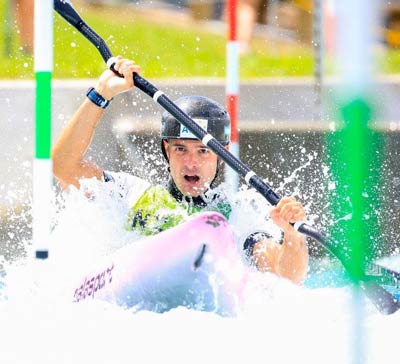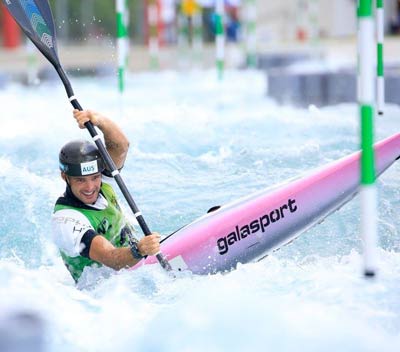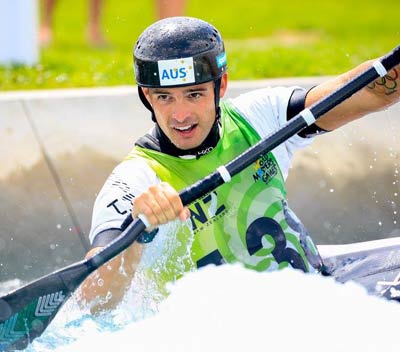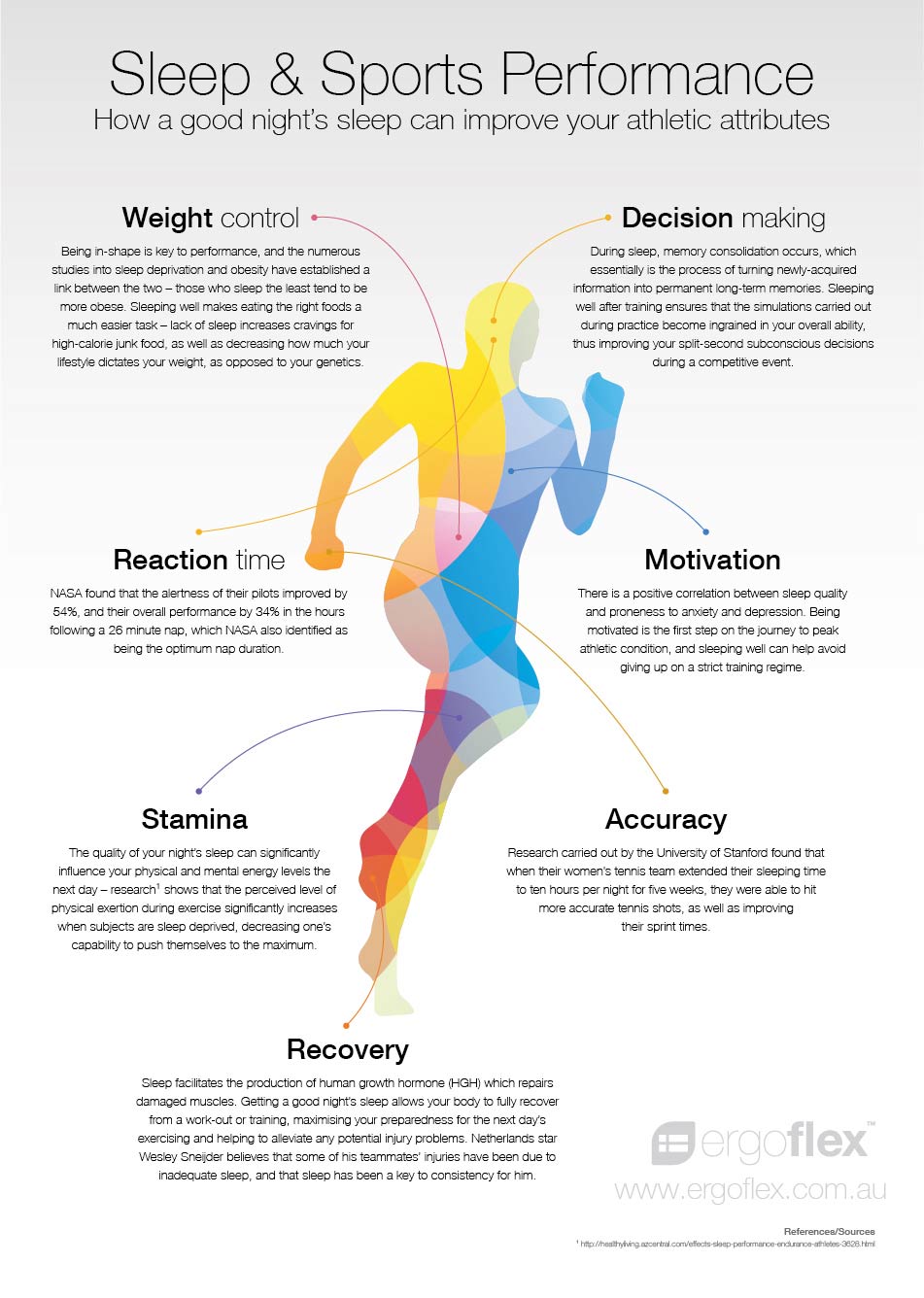Lucien Delfour - Talking Sleep and his Ergoflex Mattress
19-04-2018

Introducing our brand ambassador Australia's canoeing star Lucien Delfour, who explains how a good night's sleep is key to his performance on the water, and his recovery off it.
Sleep isn't the first thing that comes to mind when you think about sporting achievement, but in fact it plays a key role and is something that every elite athlete prioritises in their day-to-day lives.
Ergoflex has a proud history of providing consistently great sleep to sportspeople at the very top of their game. Lucien Delfour is also among the many top-level athletes who consider Ergoflex mattresses as an important part of their regimes.
The particular benefits of the Ergoflex mattress for athletes can be distilled down into two main areas – quality sleep and optimal support.
Sleep is linked to sports performance in some surprising ways. As well as being essential for restoring physical and mental energy, sleep also influences weight, motivation, stamina levels, decision making, memory performance and reaction times – all vital components of success in sport. The bulk of the body’s recovery from exertion also comes during sleep, as this is when the body creates the naturally-restorative HGH, making it absolutely key to making gains and avoiding injury. Ergoflex’s body-cradling comfort encourages quicker transition to sleep, as well as unbroken rest throughout the night. Fewer night-time awakenings means you’re able to naturally transition through the various phases of sleep, rejuvenating the body and mind in the process – the perfect preparation for sporting excellence.
Whether training or competing in events, the body goes through a lot of punishment during sports, so it needs the right support for efficient recovery. An inconsistent or unsupportive mattress won’t just disrupt sleep, it’ll also put unnecessary additional stress on the body, creating aches and pains that come after a bad night’s sleep. The Ergoflex 5G’s high-density visco-elastic layer ensures that every part of the body that comes into contact with the mattress is optimally supported throughout the night – so areas that can typically suffer on lesser mattresses, like the lower back, hips and legs, get the support that they need during sleep.
By promoting consistently deep sleep and body-cradling support, the Ergoflex 5G is the perfect partner for discerning athletes who simply can’t take risks with their sleep quality.
We spoke to our brand ambassador Lucien Delfour about his career and fitness lifestyle, and the role that sleep plays in it.
Q: Ergoflex: When did you first turn pro?
L: I turned full time in 2012 after my first World Cup medal.
Q: Ergoflex: Why canoeing? Did you have a natural aptitude for the sport from an early age, or is it something you have had to really work at?
L: I didn’t actually choose canoeing, my dad made me try it..! I had absolutely no talent, and I was terrible at it for a very long time. My slalom skills only became somewhat decent when I reached 15/16 years old. I was a very slow learner.
Q: Ergoflex: As an aspirin g professional in your earlier years, what advice were you given that you now agree or disagree with?
L: I’m not too sure I can pinpoint exactly any specific advice I was given, other than some very specific technique related tips that have helped me shape my paddling style, but I would say that I was encouraged to aim for simplicity, which is a strategy I have stuck with ever since. One thing I learnt after competing all this time is to trust your gut feeling. In slalom we have choices to make, how we approach the race and how we negotiate the gates and very often the gut feeling happen to be right.
 Q: Ergoflex: When was your first ‘professional’ race and how old were you? What was that experience like? What was it like racing at the Olympics?
Q: Ergoflex: When was your first ‘professional’ race and how old were you? What was that experience like? What was it like racing at the Olympics?
L: My first big race was the Junior World Championships, back when I was racing for France. Not exactly professional however. As a senior, my first important event was a World Cup, in 2010. It was my first year on the Australian national team, both scary and exciting. Competing in Rio was out of this world. All the cameras next to the water, and that constant noise from the crowd was overwhelming..! Warming up on the bottom pound was so strange, as it was extremely hard to concentrate with all the noise. Having the best world ranking at the time, I was last off to go in the heats, and the pressure was definitely on when I got in the starting blocks, looking down the course, the crowd and the cameras. Absolutely overwhelming, and exhilarating. My biggest regret was that I only got to do 2 runs.
Q: Ergoflex: Would you say that science and research designed to improve nutrition, fitness, rest/recovery, and ultimately success is now taken far more seriously than ten years ago?
L: I would agree, I think a lot of work has been done indeed, but within other sports. Our sport is small and we have very limited budget, but I strongly think that we could do better in all those areas. We know all these are important, but some of them can be easily neglected, like nutrition and sleep.
Q: Ergoflex: Do you feel like canoeing has taken its toll on your body?
L: Yes absolutely. I’ve been having a lot of issues with my neck in the last 4 years, and sometimes when I wake up, I feel like I’m 80 years old and struggle to get out of bed because I’m so stiff and sore. Canoeing can be hard on the neck and shoulders, but I think it really is the gym training that causes most of the damages.
Q: Ergoflex: After a race, what is the post-race recovery programme like?
L: Nothing special I would say, other than a good warm down, and proper nutrition. Having good healthy snacks is important, as we tend to crave for sweet junk food after competing. I could smash a whole block of chocolate and a bunch cookies, but unfortunately that’s not acceptable food for an athlete..!
Q: Ergoflex: Has this changed dramatically over the years?
L: Not really, I would say it has remained very similar. We do have some ‘toys’ now, like the compression sleeves (they inflate and compress your arms), compression gear, and we occasionally take ice baths, but other than that I don’t think it has changed much.
 Q: Ergoflex: How would you rate the importance of sleep?
Q: Ergoflex: How would you rate the importance of sleep?
L: I believe it’s very important and I feel it is too often neglected. I think we all know and agree that sleep is important, as it’s quite obvious. But what is less obvious to a lot of athletes and coaches is how important it is.
Q: Ergoflex: Have you always been aware of sleep’s role in fitness, or is it something that has developed with your experience?
L: I guess I always knew sleep was important, as we don’t want to be tired before the start of a session, but i didn’t know how much it affected my everyday training, and I didn’t quite know how to improve it.
Q: Ergoflex: Is nutrition is a big part of your programme? What would you recommend as a sleep-friendly food or drink? Do you have a routine or certain foods or drinks that you consume before bed?
L: Nutrition has become a much bigger part of my training in the last 2 years, and even more so since November 2016, when I started a new diet. I don’t actually have food I can recommend before going to bed, but I know that a carbohydrate heavy meal will usually help you fall asleep, however carbohydrates aren’t a big part of my diet anymore.
Q: Ergoflex: Does Canoeing Australia or your club place any particular emphasis on sleep’s importance with recommendations and advice, or is it just expected of you to manage your own sleep regime?
L: Not at all. we have done a sleep study a few years back, and we had a couple of talks, but that’s about it. I guess because it is outside of the training environment we are expected to manage our own sleeping habits.
Q: Ergoflex: Could any of your fellow pro’s use some sleep education?
L: I think anyone on the team could use some education and help! My guess is that most of us know about the basics, such as having a routine, a decent bed/mattress, but not necessarily nutrition, and things to avoid, and how much of an impact sleep actually has on performance.
Q: Ergoflex: Your career has taken you around the world – did you find any cultural differences when it came to acknowledging sleep’s importance? Any differences to France?
L: I have noticed that sleeping is highly respected in China and Taiwan. I couldn’t believe how much the athletes slept..! I would say that people in Australia care a bit more about their sleep than the French. They tend to have a more consistent routine and go to bed a bit earlier. They would also tend to spend ridiculous amounts on beds, which in my opinion is a waste of money and does not guarantee a good night sleep. I think it comes down to education, just because something is very expensive doesn’t necessarily mean it’s the best or it is what you need.
Q: Ergoflex: What’s your regular sleep routine and duration?
L: I keep mine fairly simple. No physical activities past 6.30 or 7pm, early dinner, usually around 7 or 7:30 PM, and then I just relax, watch movies for example, and I try to get ready for bed at the same time every evening. I try to get about 8 hours of sleep. I am not a great sleeper and I wouldn’t sleep much for more than 8 hours anyway. I would take a nap however, about 1 hour most days.
Q: Ergoflex: Does your sleep routine change when you’re away from home?
L: Not really, I think it’s important to keep the same routine as much as possible. The training schedule might be different but the sleep routine doesn’t have to be.
Q: Ergoflex: Do you use any wearable technology to monitor your sleep quality?
L: No.
 Q: Ergoflex: What’s your one recommendation for a good night’s sleep?
Q: Ergoflex: What’s your one recommendation for a good night’s sleep?
L: I think having a decent bed, a good routine and good sleep conditions are all important. But my one recommendation would be to limit the caffeine intake and avoid alcohol before going to bed. Personally, I could have the best mattress and the best conditions possible, I would still get a bad sleep because of caffeine or alcohol.
Q: Ergoflex: Like a lot of pro cyclists, footballers and pro rugby players, you sleep on an Ergoflex mattress. In your opinion, what makes the Ergoflex so popular with elite athletes?
L: Ergoflex mattresses are truly great and really high quality, it is a good and simple way to improve sleep dramatically and maximise performance. It also appears like unlike most brands, Ergoflex actually cares about athletes.
Q: Ergoflex: How would you describe your Ergoflex mattress? What would you say was the single biggest difference you’ve found since using the Ergoflex mattress? Has it improved your sleep?
L: The mattress is both soft and firm. It’s soft in the way that there is even pressure on the whole body, and firm in the way that the body is maintained in a good posture. The biggest difference I found is that I don’t wake up with a sore back anymore. It has definitely improved my sleep as I don’t roll and wake as much.
Q: Ergoflex: What next for Lucien Delfour?
L: This year I hope to build on my successes from 2017 and perform well at all World Cup events including the World Championships in Rio in September. I will also continue my training for Japan 2020.
* All photography courtesy of Jamie Troughton from Dscribe Media Services.

*Offer code entitles $150 discount on King Single, Double, Queen, and King mattress, and $75 discount on Long Single and Single mattress. Excludes all accessories.

Team Ergoflex Australia: Meet our team of ambassadors.
